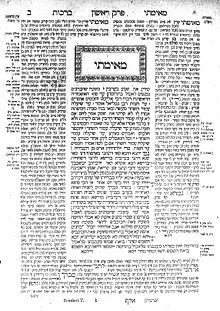The Weekly Parshiyot Reading
The weekly scripture readings are done from the Holy Scripture provided to us by great, wonderful and Holy Inspiration (click this link) of G_d almighty, through His Holy Spirit (Ruach Ha'Kodesh).It consists out of three readings;
- Torah
- Haftarah
- Brit Chadashah
This Tanakh conists out of again three parts.
- Torah (the Law)
- Nevi'im (the Prophets)
- Ketuvim (the Writings)
For clarity we will from here on use a reference from a wiki page as this provides a real clear picture.
Books of the Tanakh
The Tanakh consists of twenty-four books: it counts as one book each Samuel, Kings, Chronicles and Ezra–Nehemiah and counts the Twelve Minor Prophets (תרי עשר) as a single book.Torah
The Torah (תּוֹרָה, literally "teaching") consists of five books, commonly referred to as the "Five Books of Moses".In Hebrew, the five books of the Torah are identified by the first prominent word in each book.
- Bereshit (בְּרֵאשִׁית, literally "In the beginning")—Genesis
- Shemot (שִׁמוֹת, literally "Names")—Exodus
- Vayikra (ויקרא, literally "And He called")—Leviticus
- Bəmidbar (במדבר, literally "In the desert [of]")—Numbers
- Devarim (דברים, literally "Things" or "Words")—Deuteronomy
Nevi'im
Nevi'im (Hebrew: נְבִיאִים Nəḇî'îm, "Prophets") is the second main division of the Tanakh, between the Torah and Ketuvim. It contains two sub-groups, the Former Prophets (Nevi'im Rishonim נביאים ראשונים, the narrative books of Joshua, Judges, Samuel and Kings) and the Latter Prophets (Nevi'im Aharonim נביאים אחרונים, the books of Isaiah, Jeremiah and Ezekiel and the Twelve Minor Prophets). This division includes the books which cover the time from the entrance of the Israelites into the Land of Israel until the Babylonian captivity of Judah (the "period of prophecy"). Their distribution is not chronological, but substantive.- (יְהוֹשֻעַ / Yĕhôshúa‘)—Joshua
- (שופטים / Shophtim)—Judges
- (שְׁמוּאֵל / Shmû’ēl)—Samuel
- (מלכים / M'lakhim)—Kings
- (יְשַׁעְיָהוּ / Yĕsha‘ăyāhû)—Isaiah
- (יִרְמְיָהוּ / Yirmyāhû)—Jeremiah
- (יְחֶזְקֵיאל / Yĕkhezqiēl)—Ezekiel
- (יוֹאֵל / Yô’ēl)—Joel
- (עָמוֹס / ‘Āmôs)—Amos
- (עֹבַדְיָה / ‘Ōvadhyāh)—Obadiah
- (יוֹנָה / Yônāh)—Jonah
- (מִיכָה / Mîkhāh)—Micah
- (נַחוּם / Nakḥûm)—Nahum
- (חֲבַקּוּק /Khăvhakûk)—Habakkuk
- (צְפַנְיָה / Tsĕphanyāh)—Zephaniah
- (חַגַּי / Khaggai)—Haggai
- (זְכַרְיָה / Zkharyāh)—Zechariah
- (מַלְאָכִי / Mal’ākhî)—Malachi
Ketuvim
Also the Ketuvim can be divide up again;- The Writings
- The Scrolls
- And the Other books
Other books
Besides the three poetic books and the five scrolls, the remaining books in Ketuvim are Daniel, Ezra–Nehemiah and Chronicles. Although there is no formal grouping for these books in the Jewish tradition, they nevertheless share a number of distinguishing characteristics.- Their narratives all openly describe relatively late events (i.e. the Babylonian captivity and the subsequent restoration of Zion).
- The Talmudic tradition ascribes late authorship to all of them.
- Two of them (Daniel and Ezra) are the only books in Tanakh with significant portions in Aramaic.
Order
The following list presents the books of Ketuvim in the order they appear in most printed editions. It also divides them into three subgroups based on the distinctiveness of Sifrei Emet and Hamesh Megillot.The three poetic books (Sifrei Emet)
- Tehillim (Psalms) תְהִלִּים
- Mishlei (Book of Proverbs) מִשְלֵי
- Iyyôbh (Book of Job) אִיּוֹב
- Shīr Hashīrīm (Song of Songs) or (Song of Solomon) שִׁיר הַשִׁירִים (Passover)
- Rūth (Book of Ruth) רוּת (Shavuot)
- Eikhah (Lamentations) איכה (Tisha B'Av) [Also called Kinnot in Hebrew.]
- Qōheleth (Ecclesiastes) קהלת (Sukkot)
- Estēr (Book of Esther) אֶסְתֵר (Purim)
- Dānî'ēl (Book of Daniel) דָּנִיֵּאל
- ‘Ezrā (Book of Ezra—Book of Nehemiah) עזרא
- Divrei ha-Yamim (Chronicles)
 דברי הימים
דברי הימים
Brit Chadashah
A great translation that became available around 2016 is the Tree of Live Version (TLV).This version has been created with the unity of the grafted and the chosen people in mind.
As within EWCMI we are not bound to one specific version of the scriptures the primary version used for teaching and the weekly parashah is the Tree of Live Version.
The Division of the Brit Chadashah;
The links provided in these three groups will lead you to the Hebrews 4 Christians website.







